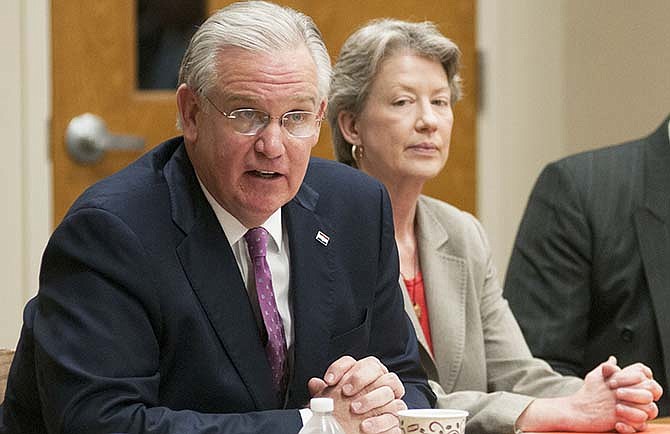Funding for conservation and natural resources in Missouri depends on state sales tax revenue.
Conservation is funded through a one-eighth-of-one-percent sales tax. Parks, soil and water are funded through a one-tenth-of-one-percent sales tax.
Sales tax cuts mean the operating budgets of the Missouri Department of Conservation and the Missouri Department of Natural Resources, of which State Parks is a part, are reduced.
There are four components of Missouri's 4.225 percent state sales tax - General Revenue (3.0 percent), Education (1.0 percent), Conservation (0.125 percent), and Parks, Soils and Water (0.1 percent). When you purchase tangible personal property or a taxable service sold at retail, portions of the sales tax collected fund conservation, soil, water and state parks.
The funds collected from these sales taxes are imperative, because the Missouri Department of Conservation collects no money from the state general revenue fund. Three-fourths of the budget for operation and development of state parks comes from the Parks, Soils and Water Tax. It is because of these taxes that Missouri State Parks are free for visitors to enter and we have public Conservation Areas all over the state. Other states only dream of free parks and public lands like we have here in Missouri.
The Conservation Sales Tax and the Parks, Soils and Water Tax were both voted into existence by the citizens of Missouri as constitutional amendments. Citizens said the outdoor heritage and natural resources of our magnificent state matter so much to us that we will self-impose taxes to ensure the necessary funds for conservation, natural resources and state parks. Now special-interest tax breaks threaten those funds.
In the final hours of the legislative session, the General Assembly passed a series of bills that included a number of sales-tax exemptions that would significantly reduce the funding of conservation, and parks, soil and water. Gov. Jay Nixon vetoed the bills, but this week the General Assembly is convening for their veto session, and certain legislators have vowed to override the vetoes.
"For decades, these voter-approved resources for conservation and state parks have helped make Missouri a national leader in wildlife and soil and water conservation and outdoor recreation," Nixon said. "Unfortunately, the grab bag of sales tax breaks passed by the General Assembly would siphon these resources away from our parks and conservation areas, and redirect them to a select few special interests."
Projections by Missouri's Office of Budget and Planning estimate that if the provisions vetoed by Governor Nixon were to become law, over the next decade funding for the Department of Conservation would be reduced by $137.2 million and revenues from the Parks, Soil and Water Tax would be reduced by $108.5 million.
The vetoed bills (House Bills 1296 and 1865, and Senate Bills 584, 612, 662, 693, 727 and 860) vary greatly. Senate Bill 612 would exempt commercial laundries and dry cleaners from state and local sales taxes on various purchases. House Bill 1296 adds graphing calculators to the back-to-school sales tax holiday. Senate Bill 693 would exempt rights of first refusal for tickets sold at the Sprint Center in Kansas City. The list goes on. How these industries, items and businesses were selected for special tax breaks is what leaves one scratching ones head.
"While this Friday free-for-all will benefit a select few special interests, its far-reaching fiscal impact has thrown the budget dangerously out of balance," Governor Nixon said. "By going on a $776 million special interest spending spree, members of the legislature have broken their own budget, and I'm prepared to fix it."
Missouri's Department of Conservation is arguably the best state wildlife agency in the country. Missouri State Parks are among the most decorated in the country. Missouri was recently voted America's favorite place to camp and was named the 2013 Best Trails State by American Trails. When will the General Assembly realize the natural OVERSET FOLLOWS:resources of Missouri are a treasure not to be trifled with?
Sales tax dollars are essential to the future of Missouri's outdoors. The citizens wanted it that way. So we must stand against legislative attempts to cripple the funding of conservation, and parks, soil and water.
See you down the trail ...
Brandon Butler is an outdoors columnist for the News Tribune. Contact him at [email protected].

